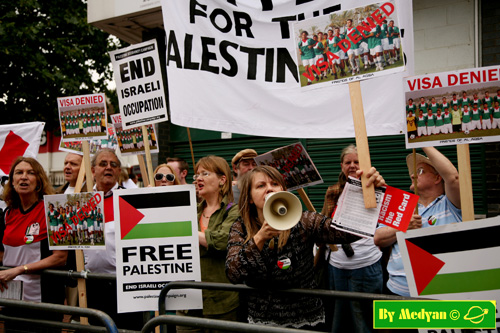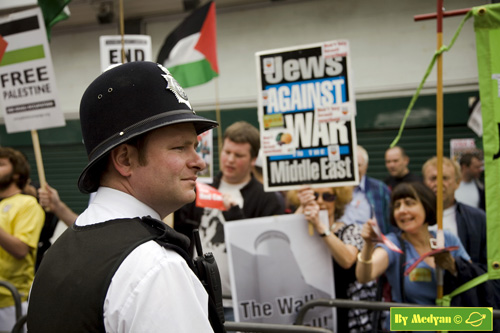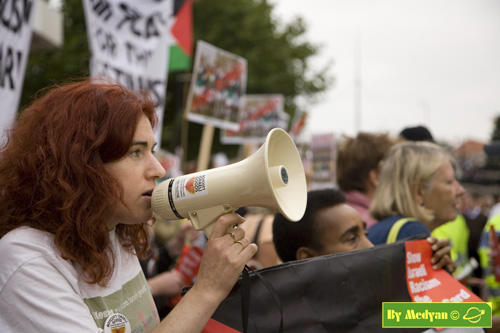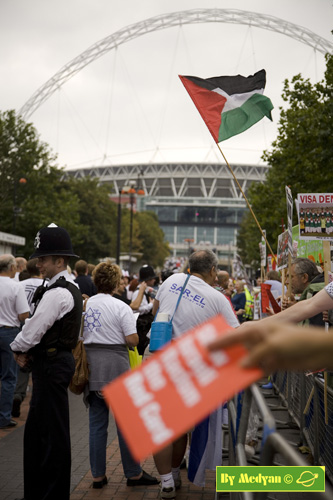 "Middle East Tensions Flare Again in U.S."
"Middle East Tensions Flare Again in U.S." On the Web at:
http://www.insidehighered.com/news/2007/09/05/middleeast
September 5, 2007
The academic year in the United States is opening with flare-ups of tensions over the Middle East, and specifically over scholars who write critically of Israel.
On Tuesday, the Middle East Studies Association released two letters protesting what the group considers to be serious violations of academic freedom. One concerns Norman Finkelstein, the DePaul University political scientist who was denied tenure in June and who has since been placed on a paid leave, with his classes called off and his office shut down. The other concerns the decision by the Chicago Council on Global Affairs to call off a lecture by John J. Mearsheimer and Stephen M. Walt, two scholars who have written a book that is harshly critical of the influence of Israel and its supporters on U.S. foreign policy.
Today, Finkelstein is expected to stage a protest over his situation by teaching the class that the university canceled and then going to his old office, from which he has been barred. Finkelstein has vowed to enter the office, even if that gets him arrested, in which case he says he will go on a hunger strike. (Update: On Wednesday, Finkelstein and the university announced a settlement. Details will appear tomorrow on this site.)
Meanwhile, at Barnard College, a tenure case that has been attracting attention since last fall is getting more intense (at least among those outside the college). Competing Web sites offer analyses of the work of Nadia Abu El-Haj, an anthropologist whose book that criticizes the use of archaeology by Israel has been praised by some and panned by others. A critic’s column this week that suggested that El-Haj’s status as a Palestinian was an important area of inquiry is being cited by Middle Eastern studies scholars as a sign of how ugly some of the debates have become.
In all the cases, there are claims and counterclaims. And the Middle East has of course long been a source of debate on American campuses. But to people with a range of views on the issues, it seems that this academic year is starting off with these disputes as tense as ever, with enough flashpoints to assure numerous conflicts.
“It seemed to me a year or so ago that things were getting a little better and the attack dogs were calmer, but now there is another spate of cases, of people up for tenure and advocating views,” said Zachary Lockman, a professor of history and Middle Eastern studies at New York University and president of the Middle East Studies Association. “There seems to be a new aggressiveness. Issues have surfaced that have given an opportunity for people to mobilize.”
Why there is so much tension this year is, not surprisingly, also a cause for debate. Critics of the professors being attacked say that it’s a question of exposing shoddy scholarship. Defenders of these professors say that critics are unwilling to let critics of Israel have a hearing on campuses, and that these critics have been emboldened by success. Last year, Juan Cole, a prominent figure in Middle Eastern studies who teaches at the University of Michigan, lost a chance for a position at Yale University. While details of the decision-making process have never been confirmed, it came after he had gained support at the departmental level but was the subject of much criticism on op-ed pages and in letters to Yale officials.
A Lecture Called Off
The canceled lecture in Chicago was just the latest of disputes involving the ideas of Mearsheimer and Walt, who hold endowed chairs, respectively, at the University of Chicago and Harvard University. They have a new book out, The Israel Lobby and U.S. Foreign Policy, which argues that the United States alliance with Israel has not advanced U.S. interests in the Middle East and criticizes the way supporters of Israel influence Congress and the executive branch. The book is an expanded version of an essay they wrote last year, which was hailed as courageous by some and criticized as irresponsible by others.
As tenured professors at top universities, the authors don’t have to worry about job security. But they do seek audiences for their ideas and they were scheduled to talk this month at the Chicago Council on Global Affairs. They were uninvited. The council has said that the reason is not fear of their ideas, but the belief that their ideas would be best explored in a program that would include “other perspectives.” According to the council, this was always the intent, and when people to oppose them could not be lined up, the event needed to be called off.
The letter from the Middle East Studies Association about the nixed talk calls the decision “a serious violation of the principles of free expression and the free exchange of ideas.” It notes that both authors have spoken at the council previously, without having anyone to oppose their views, and questioned why only when talking about their new book are they “subjected to the litmus test of ‘balance.’”
Laurie A. Brand, a professor of international relations at the University of Southern California who heads the association’s academic freedom committee, said the crucial point is the different treatment based on subject matter.
If a group wants to always have opposing views of speakers, that’s its right, she said. But to let some controversial people speak without opposition raises questions about this choice. “These are people who are prominent professors and then the council decided to withdraw the invitation, presumably because what they have to say is controversial. Part of what academic freedom is about is the ability to present new ideas, and they may be controversial. You don’t cancel someone’s presentation because you can’t find someone to counter it.”
The council’s schedule does in fact indicate that highly controversial figures do speak there frequently — without anyone in opposition. This week a lecture is scheduled by Bjorn Lomborg, famous and controversial for his “skeptical” view of the environmental movement. No one will oppose him at his talk.
Rachel Bronson, vice president for programs and studies at the council, said Lomborg’s talk was different because the Chicago group had previously had a panel discussion on the environment. She said that the claims of the Middle Eastern studies scholars were “unfounded” and that the group still planned to have a panel discussion featuring Walt and Mearsheimer. When “emotions run high” on certain topics, as she said was the case with their work, panel discussions are the best approach.
“We have a job to do. We provide interesting, stimulating panels to our members and the format is up to us. That’s how we view our job,” she said. Bronson said that doing so was more difficult when “this kind of barrage comes at us,” and she said that “outside pressure” from the Middle East Studies Association “makes this harder.”
Showdown at DePaul
The DePaul situation is also much in dispute. Finkelstein’s tenure denial followed a long, public debate over his qualifications, and the decision to stop his classes was highly unusual — drawing criticism from a number of academic groups. While DePaul hasn’t explained the latter decision, an article in the Chicago Tribune noted concerns about “threatening and discourteous behavior” — concerns that have been much disputed by backers of Finkelstein.
The letter from the Middle East studies scholars released Tuesday does not take a formal stand on the tenure decision, but raises two other issues. First, it calls it “unacceptable” that Finkelstein does not have a venue to appeal the denial, calling the lack of an appeal an “arbitrary and unjust” system.
Second, it questions the decision to place Finkelstein on leave, which is setting up today’s expected confrontation. The letter to DePaul states: “It is customary to permit faculty who have been denied tenure to teach for one final year. Your administration’s abrupt decision to prevent Professor Finkelstein (who is by all accounts an outstanding teacher) from doing so, without his agreement and despite strong objections from members of your own faculty and student body, strikes us as high-handed, if not vindictive.”
Brand stressed that it was the violation of academic norms that raised questions about the case, not whether the faculty members agreed or disagreed with Finkelstein’s take on the Middle East. Tenure decisions, she said, should be based on the quality of scholarship and teaching, not “someone’s opinions on Israel.”
A number of prominent professors, generally of the left (Howard Zinn, Derrick Bell, Richard Delgado and others, some of them quite controversial themselves, such as Ward Churchill) have issued calls to back Finkelstein. One such call says his treatment amounts to “a fundamental threat to the intellectual ferment and critical thinking so desperately needed — in academia and in society — at this time in history.”
Some at DePaul say that the statements about the impact of the case have been overstated. Jonathan Cohen, a professor of mathematics at the university, said that there is no shortage of criticism of Israel on the campus — and that most such discussion doesn’t cause much of a stir. He said one would be “hard pressed” to prove that people who criticize Israel aren’t welcome to share their views on the campus. It was not the substance of criticism, he said, but the style that got Finkelstein into trouble, he noted. Indeed, the decisions to reject Finkelstein for tenure talked about his style, and said that it did not reflect the university’s values of promoting civilized discussions.
While Cohen is not bothered by the decision in the case, he argued that the university should have challenged Finkelstein’s scholarship on substantive grounds. “I feel like there were issues about his scholarship that were real — such as where do you draw a line between advocacy and scholarship,” he said. Cohen also said that there is a problem with Finkelstein’s research (and with the book by Walt and Mearsheimer) of “serious things being omitted” from the work.
Had DePaul evaluated the quality of Finkelstein’s scholarship, instead of talking about tone, Cohen said that the university might not be accused today of infringing on academic freedom. Many supporters of academic freedom, and scholarly and faculty associations, warn that discussions of tone frequently mask discomfort with controversial ideas. “The way they worded it led them into this mess,” Cohen said.
There’s no telling what will happen today, when Finkelstein has vowed to reclaim his office. A spokeswoman for DePaul said that there were no special plans for security on the campus.
Lobbying at Barnard
The Middle East Studies Association notably did not issue a letter about the case of Nadia Abu El-Haj, the assistant professor of anthropology who is up for tenure and who has not commented on the debate that has been going on over her tenure bid. According to Brand, the academic freedom committee asked El-Haj if she wanted it to examine her case, and she declined, saying that outside letters would not be appropriate at this time. Outside commentary, however, continues to arrive.
Unlike Finkelstein, Walt or Mearsheimer, El-Haj has not been been seeking to be a public intellectual on the Middle East and the controversy concerns a book she wrote about Israeli archeology. The book, Facts on the Ground, was published by the University of Chicago Press and has received some kind reviews and some harsh ones.
When the controversy started, Barnard’s president, Judith Shapiro, appealed to alumnae to let the normal tenure process proceed. She argued that the use of outside reviewers in El-Haj’s field was the best way to evaluate her scholarship (just as such reviewers are used in other tenure cases). She also expressed “concern about communications and letter-writing campaigns orchestrated by people who are not as familiar with Barnard as you are, and who may not be in the best position to judge the matter at hand.”
Since then, opponents of El-Haj have gathered hundreds of signatures urging Barnard to deny her tenure, while others have published refutations of the criticisms of her book.
Many in Middle Eastern studies have been particularly alarmed by a recent column by Shulamit Reinharz, a Barnard alumna who is a professor of sociology at Brandeis University and wrote about her decision to skip her reunion and her concerns about El-Haj. Much of the column is similar to other criticism of El-Haj’s scholarship, but one paragraph in particular is drawing attention.
Reinharz writes: “According to information on the Web, El-Haj is a Palestinian. I was unsuccessful in my efforts to find exactly where she was born, a topic that interested me because I am not sure if she identifies as a Palestinian as a consequence of being born in what some people now call Palestine or because she identifies with Palestinians and was born elsewhere. I couldn’t find the facts.”
In an interview, Reinharz said that this was a legitimate question to ask. “She makes a point of calling herself a Palestinian scholar so I was curious about why she did that. The word Palestinian is a contested term,” Reinharz said. “There is no country yet called Palestine so I didn’t know what she meant by that.” She added that “people who call themselves palestinian garner sympathy for the Palestinian cause, and this is a book that is an attack on Israeli archaelology so I thought maybe it was relevant.” She stressed that she wasn’t inquiring about El-Haj’s religious beliefs, just what she meant by Palestinian.
“It’s not racism, it’s curiosity,” she said.
But others see this as the latest sign of how bitter the debates have become.
Lockman of NYU, called the comments “slimy” and said “I find it incredibly offensive to question someone’s place of birth or nationality.” Noting that he is Jewish, Lockman said it was inconceivable that a professor would publish a column critiquing another professor’s scholarship and devote a paragraph to wondering about what that professor meant about being Jewish. “People would acknowledge that as outrageous,” he said.
“Her origin is irrelevant to her scholarship,” Lockman said. “It’s clear people are pulling out all the stops.”
— Scott Jaschik







 Saturday September 08, 2007 21:01
Saturday September 08, 2007 21:01 by Adri Nieuwhof - The Electronic Intifada
by Adri Nieuwhof - The Electronic Intifada

 e-mail:
e-mail:  Homepage:
Homepage: 





















“Reinharz writes: “According to information on the Web, El-Haj is a Palestinian. I was unsuccessful in my efforts to find exactly where she was born, a topic that interested me because I am not sure if she identifies as a Palestinian as a consequence of being born in what some people now call Palestine or because she identifies with Palestinians and was born elsewhere. I couldn’t find the facts.”
One does not need to substitute Jew for Palestinian or be a Palestinian or a Jew or even have a dog in the Middle East studies fight to be frightened by these kind of statements.
bioscience, at 6:20 am EDT on September 5, 2007
____________________________________